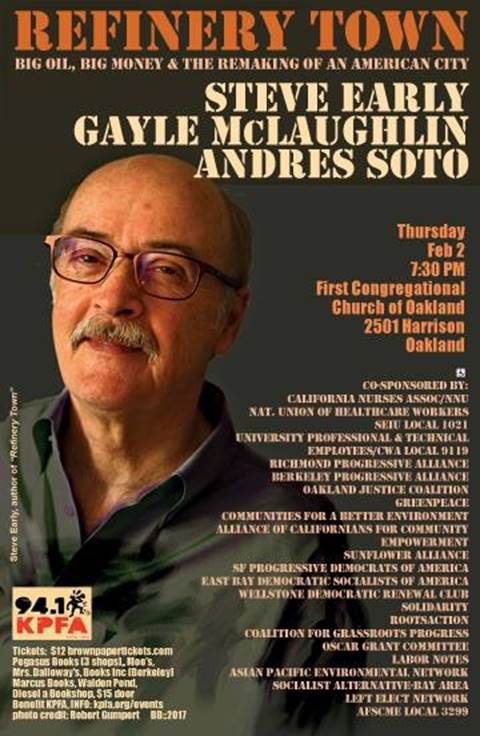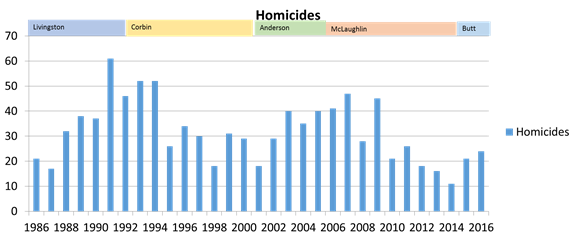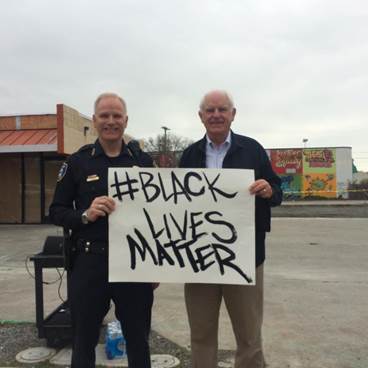I don’t often write book reviews, but this one has generated a lot of interest, local and otherwise, and deserves comment. Refinery Town is a remarkably detailed, blow-by-blow, tit for tat, account of Richmond politics, mostly over the last decade and particularly since 2012 when Steve Early moved to Richmond. I recommend you read it. You don’t often see municipal history recorded in this level of detail. For those of us who lived it, Early’s book was a fascinating read. I learned things about RPA strategy sessions that I had not previously known.
I just wonder if less engaged people and people with no association to Richmond will also find it to be a page turner. If not, it won’t be for lack of exposure. Early is crisscrossing the country promoting it, including bookstore and non-bookstore events in a dozen cities, Oakland on February 2 (below) and Richmond Rotary Club on February 3. I heard Early speak to an enthusiastic audience at Kaleidoscope on January 17, the release date.  In Refinery Town, Early has treated me both kindly and fairly, giving credit where credit is due and accurately quoting me. He provided an opportunity for me to “fact check” his draft, which I did, although the final version was somewhat different than the draft I reviewed, the not surprising work of his parsimonious editor, Steve tells me. Early got the post-2012 history pretty accurate, but may have succumbed to RPA versions of history before he arrived in Richmond that offer “alternate facts.” I realize, however, that In order to make municipal political history interesting to more than a few political groupies, the book needed a plot, and Early provided one. Every story must also have a hero and a villain. Add in good and bad entangled in a fight to the death. In Refinery Town, the hero is the RPA, and the villain is, you guessed it, Chevron, along with a few sub-villains such as the Point Molate casino. In the end, the RPA smote the villains, and Richmond became the shining city on the hill. Unfortunately, it’s not that simple, and the role of the RPA was not actually that decisive. Despite its recent triumphs in the 2016 election, the RPA has had as many or more failures as successes, and their successes always depended on collaboration with non-RPA City Council members. But in the book, everything they did or anything positive that happened to Richmond is cited as an RPA success. City Manager Bill Lindsay On page 4, Refinery Town states, “McLaughlin hired a good government city manager [Bill Lindsay], who straightened out the city’s books…. and on page 46, Refinery Town states, “One of the most important actions that McLaughlin and council allies like Tom Butt took, even before she became mayor, was hiring Bill Lindsay as city manager.” The fact is that Bill Lindsay was hired on December 7, 2004, before McLaughlin or any other RPA member was on the City Council. It was a majority that included mostly RPA foes who actually hired Lindsay. Richmond’s Community Policeman An entire chapter of Refinery Town (“Richmond’s Community Policeman”) focused on reform of the Richmond Police Department by Chief Chris Magnus, implying that the reduction in crime and national recognition during Magnus’ term was a result of RPA leadership.
In Refinery Town, Early has treated me both kindly and fairly, giving credit where credit is due and accurately quoting me. He provided an opportunity for me to “fact check” his draft, which I did, although the final version was somewhat different than the draft I reviewed, the not surprising work of his parsimonious editor, Steve tells me. Early got the post-2012 history pretty accurate, but may have succumbed to RPA versions of history before he arrived in Richmond that offer “alternate facts.” I realize, however, that In order to make municipal political history interesting to more than a few political groupies, the book needed a plot, and Early provided one. Every story must also have a hero and a villain. Add in good and bad entangled in a fight to the death. In Refinery Town, the hero is the RPA, and the villain is, you guessed it, Chevron, along with a few sub-villains such as the Point Molate casino. In the end, the RPA smote the villains, and Richmond became the shining city on the hill. Unfortunately, it’s not that simple, and the role of the RPA was not actually that decisive. Despite its recent triumphs in the 2016 election, the RPA has had as many or more failures as successes, and their successes always depended on collaboration with non-RPA City Council members. But in the book, everything they did or anything positive that happened to Richmond is cited as an RPA success. City Manager Bill Lindsay On page 4, Refinery Town states, “McLaughlin hired a good government city manager [Bill Lindsay], who straightened out the city’s books…. and on page 46, Refinery Town states, “One of the most important actions that McLaughlin and council allies like Tom Butt took, even before she became mayor, was hiring Bill Lindsay as city manager.” The fact is that Bill Lindsay was hired on December 7, 2004, before McLaughlin or any other RPA member was on the City Council. It was a majority that included mostly RPA foes who actually hired Lindsay. Richmond’s Community Policeman An entire chapter of Refinery Town (“Richmond’s Community Policeman”) focused on reform of the Richmond Police Department by Chief Chris Magnus, implying that the reduction in crime and national recognition during Magnus’ term was a result of RPA leadership.
Early writes on page 4, “McLaughlin hired a good government city manager [Bill Lindsay], who straightened out the city’s books, as well as a new police chief who retrained the city’s force to emphasize community relations and de-escalation,” and “Progressive leaders in Richmond hired a visionary gay police chief, who increased public safety through real community policing On page 68, Early writes “Fortunately, City Manager Bill Lindsay and then city councilor Gayle McLaughlin and others in city government decided to take a chance on a man none celebrated as one of the country’s most effective police reformers.
It was neither the City Council nor any RPA member who selected and hired Chris Magnus. It was solely Bill Lindsay, but we all, of course, took credit. Although the RPA embraced Magnus, he was not a fan of the RPA and did not reciprocate their admiration. On January 24, 2017, Chris Magnus posted on Facebook (Everybody’s Richmond California), “They [RPA] are basically the Green Party version of Trump. Same basic level of intolerance and insecurity.” Although embracing Magnus and his reforms, the RPA has continued to be at war with the Police Department ever since the Richmond Police Officers Association (RPOA) attacked RPA candidates in elections as far back as 2008. Despite any evidence of bias against African Americans by the Richmond Police Department, RPA members seized on the spirit of “Black Lives Matter” and set about to expand the powers of the Police Citizens Review Commission. In the Pedie Perez matter, Individual RPA members took the side of the Perez family despite no evidence from multiple investigations that Perez was murdered by a police officer. Jovanka Beckles took on the Richmond Police Officers Association, saying, “When I speak about the police officers association, I want everyone to realize, I’m not speaking about the rank and file, I am speaking solely about the police officers association. We all read the news, we all see how this union operates – they defend racist murders and you know they defend to the core, to the point of making the victim’s look like the criminals.” On a related note, the City Council has been unable to hire a Citizens Police Review Commission investigative officer after months of solicitations and interviews largely because no applicant could pass the RPA’s purity test for the applicant to have had no prior law enforcement experience. Despite a vote nearly a year ago to have the commission investigate the Pedie Perez death, no investigation has been completed. The part-time investigator who had been working on it abruptly quit earlier this month, pleading insufficient time to complete it. The Chevron Modernization Project and the Environmental and Community Investment Agreement (ECIA) On page 3, Refinery Town states,” A community mobilization led by environmental justice groups and the RPA helped the City win $90 million in financial concessions from Chevron in return for approving a refinery modernization project that both critics and proponents hoped would improve safety and reduce pollution.” In fact, RPA City Council members did not vote in favor of the $90 million settlement. It was passed narrowly with only four “yes” votes, including RPA enemies Nat Bates and Corky Booze. Municipal Power Plant On page 40, Refinery Town states, “Calling themselves the Richmond Alliance for Green Public Power and Environmental Justice, Reardon’s group opposed construction of a municipal power plant next to the Chevron refinery.” In fact, there was never a serious proposal to build a municipal power plant next to the Chevron Refinery. $114 Million Settlement Agreement On page 52, Refinery Town states, “She [McLaughlin] urged voters to remember her six-year record on the city council, including her role in achieving the city’s $114 million tax settlement with Chevron.” In fact, in the mediated settlement negotiations, Richmond was represented by Butt, Rogers and Ritterman. McLaughlin only voted to approve it. The Mayor’s Power On page 49, Refinery Town states “McLaughlin presided over a city…,” as if the mayor had real power. I know only too well that all the mayor presides over is City Council meetings; the city manager runs the City. On the same page, Early correctly recalls that “the mayor took credit for attracting one thousand new jobs,” but all that represented was the number of employees listed on business license applications. There is no evidence that the mayor or anyone else played a key role in creating new jobs. Also on page 49, Early notes, “Richmond did launch the Worker Cooperative Revolving Loan Fund (WCRLF) as a grant-funded stopgap measure and demonstration that ‘another world is possible,’” but the fund has been unable to launch a single sustainable cooperative. An Evolution – Not a Revolution The only criticism I have of Refinery Town is that it paints an inaccurate picture of the role the RPA played in whatever successes Richmond has enjoyed over the last few years. I have a much longer and more strategic view of change at City Hall than Refinery Town conveys. I see Richmond’s changes as more of an incremental evolution in a continuum than a revolution led by the RPA. In the 1980s, George Livingston beat Republican Lavonne Nicholls in a mayor’s race that turned on development of the southern shoreline. Nicholls wanted more industry, and Livingston championed parks, housing and commerce. After the election, the City Council approved a new shoreline plan that envisioned what we have today. At the end of the 1980s, progressive Council member David MacDiarmid took on both Chevron and Darrell Reese and was rewarded by a nasty campaign that removed him from office.
In the early 1990s, Rosemary Corbin defeated incumbent Mayor George Livingston, who had subsequently become too chummy with Chevron interests. Like the RPA, Corbin took no corporate money, and was helped by an army of citizen volunteers. Chevron’s flack was quoted on the front page of the paper the day after her election that she would be “bad for business.” The homicide rate was reduced as dramatically during Corbin’s term as in McLaughlin’s term. After Richmond lost the progressive Chief Bill Lansdown, City Manager Isiah Turner hired Samuels, who was not committed to community policing, so the crime rate began to climb again. Corbin was also responsible for garbage rate regulation, for Richmond’s recycling and hazardous waste disposal programs as well as advancing parks, open space, the Bay Trail and historic preservation. Corbin was extremely active with the US. Conference of Mayors where she secured many millions of dollars for Richmond because of contacts made in Washington.

In Irma Anderson’s single term, she championed the public policy initiative that ultimately resulted in establishment of the Office of Neighborhood Safety. I have been at this for over 20 years, and I have been fighting Chevron that entire time, as have people like former Mayor Rosemary Corbin and former councilmembers Jim Rogers, and Tony Thurmond as well Jael Myrick. I look at it more like the RPA joining the fight that people like Rosemary and I had been carrying for years and providing the votes to make a majority. Historically, the “Nat Bates for Mayor” film released last year is very instructive about this evolution. For years, the African American vote in Richmond was manipulated by Chevron, industry, developers, the public safety unions and power brokers like Darrell Reese to control the City Council. You saw the last gasp of all that in “Nat Bates for Mayor.” Richmond is now a more diverse city with a lot of new people in it who want good government and good quality of life and understand what it takes to get there. Until Eduardo Martinez was elected in 2014, the RPA never had more than two seats on the City Council. Everything the RPA has accomplished prior to January 2017 has depended on working with non-RPA allies, including Jael and me. This should be a story about collaborations more than RPA leadership. As most people know, I have collaborated with the RPA much more than we have clashed. Our closest collaboration has been on environmental and sustainability issues, including joining MCE for renewable energy, banning chemical pesticide use by City workers and adopting a series of planning documents on the cutting edge of sustainability, beginning with the General Plan 2030 in 2012 and more recently the new Zoning Code, Climate Action Plan and Richmond bay Specific Plan. In 2008, Gayle McLaughlin joined with Jim Rogers, Tony Thurmond and me in unsuccessfully opposing Chevron’s first run at their refinery modernization project, which was approved on a 5-4 vote. The Court eventually overturned the approval, and RPA City Council members joined with me to encourage Chevron to reapply with a project design and EIR that would address the shortcomings in the original submittal. Just within the last year, two of the three RPA City Council members joined with me approve a new four-year contract with Bill Lindsay. As I have pointed out many times, anything the RPA has taken credit for is only because its members were able to collaborate with other non-RPA City Council members, or vice-versa. Up until now, Richmond politics has been a team sport. 